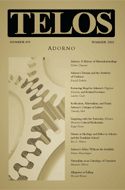Howard Eiland’s “Allegories of Falling” appears in Telos 155 (Summer 2011). Read the full version online at the Telos Online website, or purchase a print copy of the issue in our store.
 Although the story of the Fall of Man, as recounted in the biblical book of Genesis, has been a continual source of literature and thought, its meaning remains elusive. At issue in the story is the conception of self-consciousness, understood as a power of reflection on the immediacy of experience, a division in being (I am now “beside myself” in shame) that parodies the original division and articulation of things in the act of Creation. Adam and Eve awaken from their child-like absorption, awaken from and to their nakedness; they fall into the world and into history, as into adulthood. It is in the context of this mortal knowledge and emergent negotiation of distance that the ur-Christian problematic of the “now,” involving the distinction of chromos from kairos, manifests its paradoxical gravity, something obscured by linear eschatologies. The messianic awakening is not a simple restoration of immediacy, nor any solid “ground,” but readiness for the sudden transformation of chromos into kairos, an allegorizing of experience as the play of eternal transience. Among the many literary afterlives of the garden/world allegory, this article focuses on examples from the works of Shakespeare, Dickens, and Kafka.
Although the story of the Fall of Man, as recounted in the biblical book of Genesis, has been a continual source of literature and thought, its meaning remains elusive. At issue in the story is the conception of self-consciousness, understood as a power of reflection on the immediacy of experience, a division in being (I am now “beside myself” in shame) that parodies the original division and articulation of things in the act of Creation. Adam and Eve awaken from their child-like absorption, awaken from and to their nakedness; they fall into the world and into history, as into adulthood. It is in the context of this mortal knowledge and emergent negotiation of distance that the ur-Christian problematic of the “now,” involving the distinction of chromos from kairos, manifests its paradoxical gravity, something obscured by linear eschatologies. The messianic awakening is not a simple restoration of immediacy, nor any solid “ground,” but readiness for the sudden transformation of chromos into kairos, an allegorizing of experience as the play of eternal transience. Among the many literary afterlives of the garden/world allegory, this article focuses on examples from the works of Shakespeare, Dickens, and Kafka.







